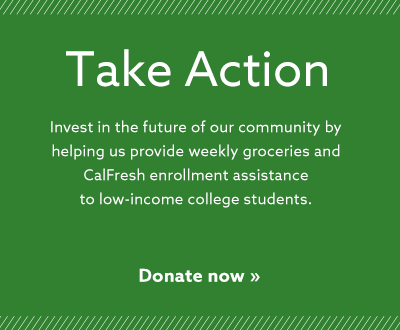Some college students talk about the “Freshman 15,” and gaining weight when starting school. But for other students, the financial burden of tuition and books often means going hungry. In fact, the US Government Accountability Office released a report recently that quantifies how large a problem college hunger has become.
Annie is one such student who struggles to feed herself many weeks out of the year. She’s studying at UCSF for a health care career and utilizes the Food Bank’s campus pantry. “The market has revolutionized my routine,” says Annie. “I exclusively get my food here. I’m eating healthier and wouldn’t be getting my fruits and veggies otherwise.
“Food insecurity is very real if you don’t come from a family that can provide you with a weekly stipend. Having all this debt, you’re kind of in crisis mode all the time. Many students only eat one meal a day. You can’t study; you’re stressed out all the time; and it has traumatic effects on your body.
“I am undyingly grateful to the Food Bank donors. Because of your generosity, I’m able to eat healthier, take care of myself, and give back by caring for patients. Thank you for investing in my health, so I can invest in the health of others.”



Share